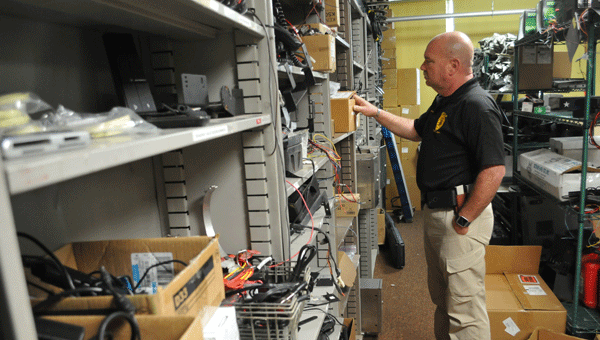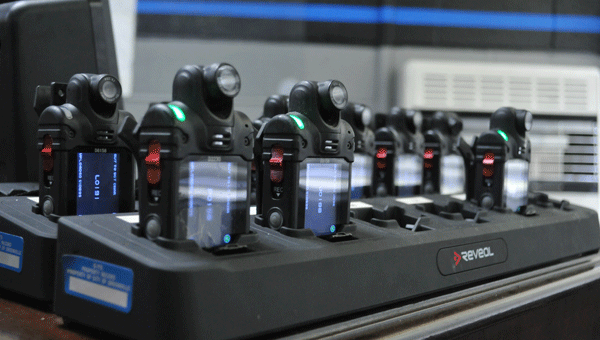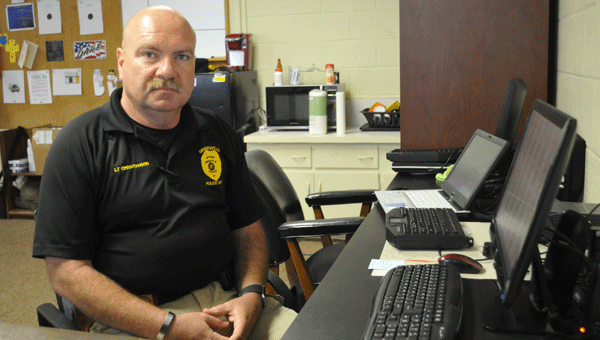Christianson GPD’s jack of all trades
Published 5:34 pm Friday, May 19, 2017
For many, police work is solving a domestic dispute, issuing a traffic violation or any of the hundreds of functions officers perform in the public eye.
Senior lieutenant Marcus Christianson has done his share of that sort of police work in the course of his 23-year tenure at the Greenville Police Department. He has decades of cuts, scars and a partially metal leg accumulated in the line of duty to prove it.
Not that Christianson has to prove anything to anyone these days. As the department’s logistics head, a deceptively simple title that carries an enormous amount of responsibility, most other officers within the department acknowledge him as the glue that holds the whole thing together.
“I do anything from research on current equipment and tactics to writing office policies,” Christianson said.
“I try to stay ahead on technology enough to recommend what we need to get to the chief—that includes body cameras, computers, etc. And I try to keep everything running, too. I’m not an I.T. guy, but I do a lot of the I.T. stuff here.”
It doesn’t end there. He collects bills and receipts from local vendors who deal with the police department. He checks and performs maintenance on the department’s fleet. A visit to his office would reveal that he’s often embroiled in phone conversations with tech reps or equipment salesmen in search of a good deal, or buried in research for better police gear.
He’s responsible for making seemingly minute decisions that can often have huge implications. For instance, when ordering new vehicles for the department, maneuverability and cornering is far more important than top speed. After all, given the rural nature of the Camellia City, patrolmen will rarely need to break 200 miles per hour in a high-speed chase.
He also writes grants, a process he calls “a real pain in the neck.”
But according to him, whether dealing with citizens on the streets or putting out any of a dozen metaphorical fires within the department, public service requires a special sort of person.
“If you don’t come home emotionally tired, you did not invest in the people you were dealing with that day,” Christianson said.
Despite the current political climate and litany of headlines involving law enforcement around the country, Christianson says that—at least crime-wise—the situation in Greenville is a far cry from the mid-90s, when he began his career in law enforcement.
“The town is actually a lot calmer now than it used to be,” he said. “Between untaxed liquor and Sunday nights on Baptist Hill, where anywhere from 400-500 people would be packed up, it was rough.
“It was nothing to go home with a torn-up uniform back then,” he added with a chuckle.
So what changed?
“Some of it was a change in policing,” he said. “Some of it was because the community stopped putting up with a lot of it. And the community is a lot more behind us in general than they used to be; or at least, it seems that way.”
Technology has changed even more than temperaments in the past two decades.
One of the biggest contributions is the implementation of body cameras on all GPD patrolmen. The department’s cameras come courtesy of Reveal Media, a British company and one of the oldest body cam producers around (the British’s use of body cameras predates the United States by several years).
The cameras are used in potentially confrontational situations, such as routine traffic stops, for both the protection of officers and citizens.
A second, far more discrete innovation is the switch to an entirely digital radio system.
“You can’t pick us up on scanner,” Christianson said. “If you happen to get a digital radio, first it has to be the same brand. And we added a military-grade encryption on top of ours. So if you manage to get our frequency and our data algorithms, now you’ve got to get our encryption code.”
There are dozens of scenarios in which having a private, secure line of communication would be beneficial to officers, but one past event in particular comes to mind for Christianson.
“The first week we had it online, we got a call about a possible shooter at the high school,” he said. “Normally, you’ve got everybody in town listening to a scanner. So before we’re even there, you could have parents running in there to get their kids and wanting to know what’s going on. That causes more harm to their kids, and to us, because we can’t focus on what we’re doing. We were there 45 minutes before one of the kids managed to go on Facebook and say ‘hey, the cops are here.’ We were able to handle it quietly and safely instead.”
Stressful situations such as the aforementioned school threat are par for the course in the line of duty and, unfortunately, such occasions can take a toll.
Christianson suffered a heart attack just last year, and the recovery process took nearly three months. Even then, he still managed to make his way back to the office twice a week to make sure the system hadn’t fallen completely apart without him.
Though retirement looms somewhere in the distance for him, he’s more concerned with the legacy he’ll leave behind.
“I’m just trying to be useful and earn my keep,” he said. “I ain’t no hero—I’m just an old jarhead trying to make it.
“I just hope I’m leaving my officers a little better equipped and a little safer than how I found them.”








